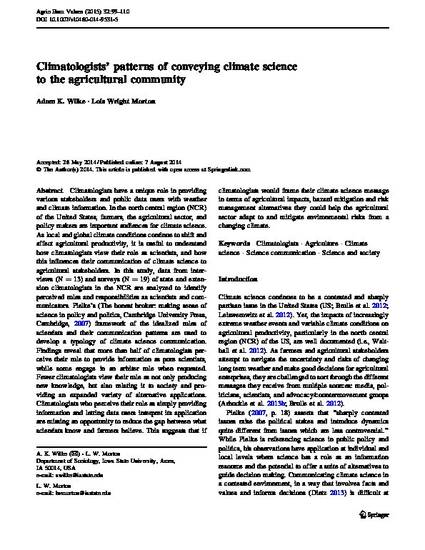
Climatologists have a unique role in providing various stakeholders and public data users with weather and climate information. In the north central region (NCR) of the United States, farmers, the agricultural sector, and policy makers are important audiences for climate science. As local and global climate conditions continue to shift and affect agricultural productivity, it is useful to understand how climatologists view their role as scientists, and how this influences their communication of climate science to agricultural stakeholders. In this study, data from interviews (N = 13) and surveys (N = 19) of state and extension climatologists in the NCR are analyzed to identify perceived roles and responsibilities as scientists and communicators. Pielke’s (The honest broker: making sense of science in policy and politics, Cambridge University Press, Cambridge, 2007) framework of the idealized roles of scientists and their communication patterns are used to develop a typology of climate science communication. Findings reveal that more than half of climatologists perceive their role to provide information as pure scientists, while some engage in an arbiter role when requested. Fewer climatologists view their role as not only producing new knowledge, but also relating it to society and providing an expanded variety of alternative applications. Climatologists who perceive their role as simply providing information and letting data users interpret its application are missing an opportunity to reduce the gap between what scientists know and farmers believe. This suggests that if climatologists would frame their climate science message in terms of agricultural impacts, hazard mitigation and risk management alternatives they could help the agricultural sector adapt to and mitigate environmental risks from a changing climate.
Available at: http://works.bepress.com/adam-wilke/4/

This is an article from Agriculture and Human Values 32 (2015): 99, doi:10.1007/s10460-014-9531-5. Posted with permission.